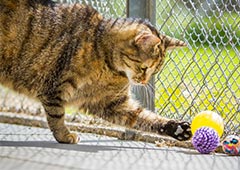Are you a first time proud or prospective cat owner? Want your furry friend to be calm, domesticated and fit well into family life? Well, if you’ve purchased a kitten (or a cat that hasn’t had the procedure done), you will have to look at getting the animal desexed.
Desexing is an important, normal procedure that most domesticated animals like dogs and cats must go to, for a number of relevant reasons. Not only does it prevent the existence of ‘wild’ and ‘stray’ animals that can cause havoc with other pets and the environment, it can help calm your cat and keep them content. Desexing your animals is a common courtesy to your neighbours and other pet owners in your suburb, ensuring that all the neighbourhood pets get along - you’ll find out why if you read on!
Why should I desex my cat?
Desexing your cat has major benefits when it comes to your feline friend’s behaviour and safety, as well as keeping unwanted kittens from being born. (You may think that having lots of kittens would be great problem to have, but when you have to microchip, vaccinate and sell them all...it’s quite the hassle).
-
Behavioural changes and unwanted kittens
When left undesexed, female cats will display very unusual and irritating behaviour when they are ‘in season’, aka when their hormones encourage their natural breeding instinct. They will wale and ‘caterwaul’, which is extremely annoying when it’s happening in the middle of the night - for you and your neighbours. In addition, they will scratch at the door begging to be let out to find a male.
On the other hand, undesexed male cats will become at risk of fighting every male who comes their way. Essentially they fight over females aggressively, trying to claim the right to mate with females and assert their dominance - and the fights are vicious. Clawing, biting, spraying - these cats can do some serious damage to each other, which means hefty vet bills. Desexing your male cat means this instinct to roam will be quelled, and you won’t be constantly worried your cat is out roaming for a fight or a female. Other behaviours male cats exhibit are growling and hissing - not attributes that contribute to peaceful, friendly household, especially when you have children.
If you don’t desex your cats, you are pretty much guaranteed to have to deal with unwanted kittens (if you have a female). Cats by nature have a very strong breeding instinct, and many cat owners mistake their feline friends scratching at the door and yowling as a sign they need to go to the bathroom - at which point they take off to find a male. They will actively seek out other cats for them to breed with, and virtually won’t stop until they have successfully mated with a male. Therefore, if your cats not desexed, there’s a very high chance you will have to deal with a litter of kittens in 9 weeks time when you let them out for the ‘bathroom’.
All this unwanted roaming also puts your cats at risk of accidents such as being run over, or attacked by other animals such as dogs. Not to mention the growing tension can escalate between your neighbours when your cats won’t stop wailing and scratching!
-
Curbs the feral and unwanted cat problem
Unfortunately, feral and unwanted cats are a major issue in Australia, with a very, very large number of animals having to be put down due to shelters not being able to find a new home. Desexing your cat ensure that you don’t have to deal with a litter of unexpected kittens, or that no abandoned/unwanted cats are produced as a result of your male cat roaming to find a female.
Desexing your cat is definitely necessary to prevent adverse behaviours and risks for your feline friends, and also helps curb the issue of unwanted pets in Australia. Not to mention the peaceful household you’ll have!
How old does my cat need to be to get desexed?
Cats can be desexed at any age. There’s a common myth that cats need to be at least 6 months old before they are desexed, however its actually better to perform the operation on younger cats aged 2 months or higher. This is because kittens bounce back from the surgery fast. If you’ve got a new cat, waiting until the 6 month mark can definitely be risky - cats as young as 5 months can become pregnant.
Cats older than 6 months can definitely also be desexed, however their recovery may take slightly longer at home. It’s still perfectly normal to get an older cat desexed if it hasn’t already been.
Remember to check with the breeder as to whether your cat has been desexed - most pure breed cats have already had the procedure done before they reach their new owners.

Will my cat have to be in the veterinary surgery for long?
Desexing is generally a same day operation - you will be able to pick your cat up at the end of the day that they had the procedure. They will most likely give you some medicine for pain relief - and your cat may be a bit sore and sulky for a couple of days, but they will be back to your normal, happy playful feline before you know it.
Some common myths about desexing your cat
There are certain old wives tales that stop people from desexing that are, for all intensive purposes, untrue. Do not let any of these questions stop you from desexing your animal.
-
Desexing my cat will make them gain weight
If you’re feeding your cat nutritious, healthy food and are letting them exercise regularly, then your cat will definitely not gain weight due to desexing. The only reason they would gain weight is because they are living an unhealthy lifestyle.
-
It’s beneficial for a females health for her to have a litter of kittens before I get her desexed
Not sure where this one came from, but there’s no truth to this myth. In fact, the opposite is true - desexing a female who’s already had a litter of kittens makes the procedure more difficult.
-
Desexing my cat will make their personality change completely
Again, this also isn’t true. Desexing your cat will reduce the aggressiveness and irrational behaviour due to the lack of hormones raging through their body, but all of the cute and cuddly qualities they had before will stay.
So if you’ve bought a new cat or kitten and it’s not desexed, give your local vet a call to schedule a time. Not only will it help ensure the cat fits into your family life, it’ll keep your furry friend safe and stop any unwanted kittens from surprising you!
Also, if you like to keep your cat outside and want to make sure they can’t get out and roam around at night, you should look at our Paws Parlour, Kitty Kastle and Purrfect Palace cat enclosures that will keep them comfortable and safe. You can both sleep soundly!


















